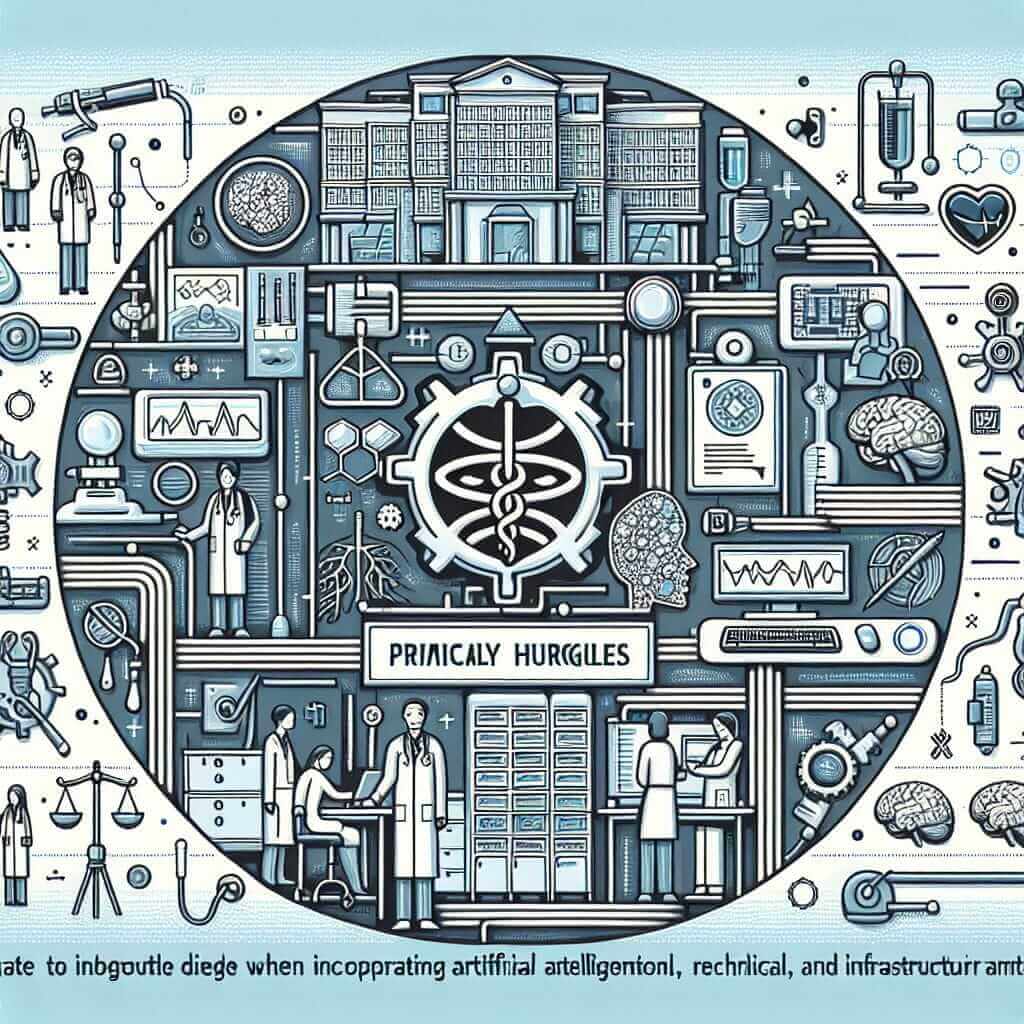The IELTS Reading section can be quite challenging, especially when it comes to topics that involve advanced and technical content. One such topic that has gained popularity over recent years due to its significance and complexity is the integration of Artificial Intelligence (AI) into healthcare systems. Given the increasing importance of AI in various domains, there’s a high probability that similar topics could appear in future IELTS exams.
Analyzing past IELTS Reading exams, it’s apparent that subjects related to technology and scientific advancements are increasingly featured. This guide will help you understand the intricacies of such a topic and provide you with a comprehensive reading exercise, including questions and answers to practice your Reading skills.
Reading Passage Example
Challenges of Integrating AI into Healthcare Systems
Artificial Intelligence (AI) has promised to revolutionize healthcare, offering improvements in diagnosis, treatment, and patient outcomes. However, the integration of AI into healthcare systems is fraught with challenges. These challenges fall into several key categories: ethical, regulatory, technical, and infrastructural.
Ethical Challenges
One of the most prominent ethical issues is data privacy. Healthcare data is highly sensitive, and any breach can have severe consequences. Ensuring that AI systems comply with stringent data protection regulations, such as the GDPR in Europe or HIPAA in the United States, is paramount. Moreover, there are concerns about bias in AI algorithms. If the training data on which AI models are based is biased, the AI itself will perpetuate these biases, potentially leading to unequal treatment of patients.
Regulatory Challenges
In healthcare, patient safety is of utmost importance. Thus, any AI system must undergo rigorous testing and validation before it can be implemented. Regulatory bodies like the FDA in the United States require substantial evidence to ensure that AI applications do not compromise patient safety. Navigating these regulatory landscapes can be complicated and time-consuming.
Technical Challenges
From a technical standpoint, integrating AI into existing healthcare IT systems is complex. Most healthcare systems are built on legacy software that does not easily accommodate new technologies. Additionally, AI solutions must be highly accurate and reliable. The use of AI for diagnosis or treatment requires precision, as errors can have life-threatening consequences.
Infrastructural Challenges
Healthcare systems vary greatly across different regions and institutions. Infrastructure that can support AI technology, including proper hardware and data storage solutions, is not universally available. There’s also a need for skilled personnel who understand both AI and healthcare to effectively manage and interpret AI solutions.
Despite these challenges, the potential benefits of AI in healthcare are immense. Advancements in AI technology and ongoing efforts to address these challenges are paving the way for more seamless integration in the future.

Practice Questions
1. Multiple Choice
Choose the correct answer, A, B, C, or D.
1.1 What is a significant ethical challenge in integrating AI into healthcare?
- A. Cost of implementation
- B. Data privacy
- C. Lack of skilled personnel
- D. Outdated regulations
1.2 Which agency in the United States ensures the safety of AI applications in healthcare?
- A. GDPR
- B. FDA
- C. HIPAA
- D. WHO
2. Identifying Information: True/False/Not Given
2.1 Ensuring the precision of AI solutions in diagnosis is a technical challenge. (True/False/Not Given)
2.2 All healthcare systems globally have the infrastructure to support AI technology. (True/False/Not Given)
3. Matching Headings
Match the headings (i-iv) to the paragraphs (1-4) in the passage.
i. Ethical Challenges
ii. Technical Challenges
iii. Infrastructural Challenges
iv. Regulatory ChallengesOr write answers with the appropriate numbers
4. Sentence Completion
Complete the sentences below with no more than two words from the passage.
4.1 AI models trained on _____ data may lead to biased outcomes.
4.2 AI solutions in diagnosis require high ____ to avoid life-threatening errors.
Answer Key
1. Multiple Choice
1.1 B. Data privacy
1.2 B. FDA
2. Identifying Information: True/False/Not Given
2.1 True
2.2 False
3. Matching Headings
-
i. Ethical Challenges
-
iv. Regulatory Challenges
-
ii. Technical Challenges
-
iii. Infrastructural Challenges
4. Sentence Completion
4.1 biased
4.2 accuracy
Lessons Learned
The common pitfalls in such reading exercises usually involve misunderstanding the context or specific details given in the paragraphs. Here, recognizing keywords such as “ethical,” “regulatory,” “technical,” and “infrastructural” challenges helped in matching headings correctly. Understanding the significance of regulatory bodies like the FDA and the importance of data privacy in ethical issues were crucial for answering multiple-choice questions accurately.
Vocabulary
- Bias (n.) /baɪəs/: inclination or prejudice for or against one person or group, particularly in a way considered to be unfair.
- Regulation (n.) /ˌrɛɡjuˈleɪʃən/: a rule or directive made and maintained by an authority.
- Infrastructure (n.) /ˈɪnfrəˌstrʌktʃər/: the basic physical and organizational structures and facilities needed for the operation of a society or enterprise.
- Precision (n.) /prɪˈsɪʒən/: the quality, condition, or fact of being exact and accurate.
Grammar
- Gerunds and Infinitives: Understanding the use of gerunds and infinitives can help you grasp the meaning of complex sentences. Example: “Ensuring compliance with data protection regulations is paramount.”
- Complex Sentences: Practice constructing and deconstructing complex sentences to improve both your writing and reading comprehension.
Tips for IELTS Reading Success
- Skim and Scan: Develop quick reading techniques to locate information efficiently.
- Expand Vocabulary: Build a strong vocabulary to understand and interpret a wide range of texts.
- Practice Regularly: Consistent practice with mock tests and sample readings will enhance your ability to manage time and understand complex texts.
- Understand Question Types: Familiarize yourself with different question types to avoid surprises during the exam.
- Review Mistakes: Analyze and learn from your mistakes to improve accuracy and speed in answering questions.
With diligent practice and a strategic approach, you can conquer the IELTS Reading section and achieve a high score.